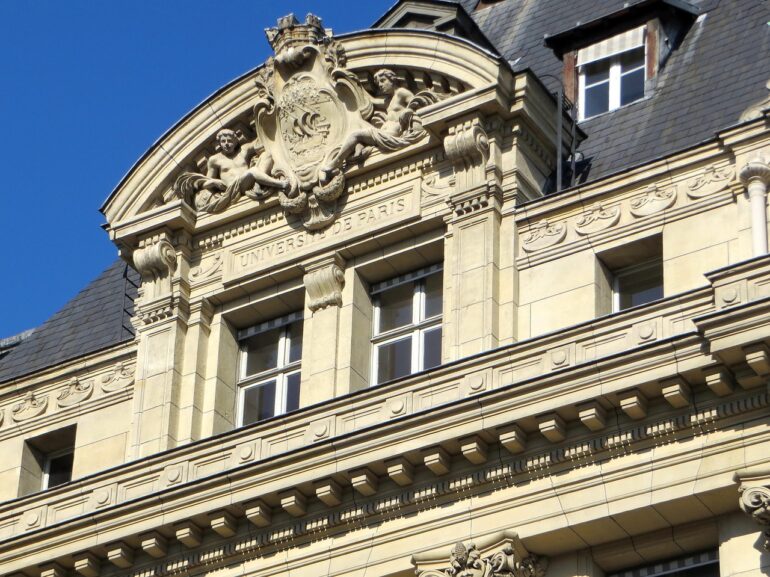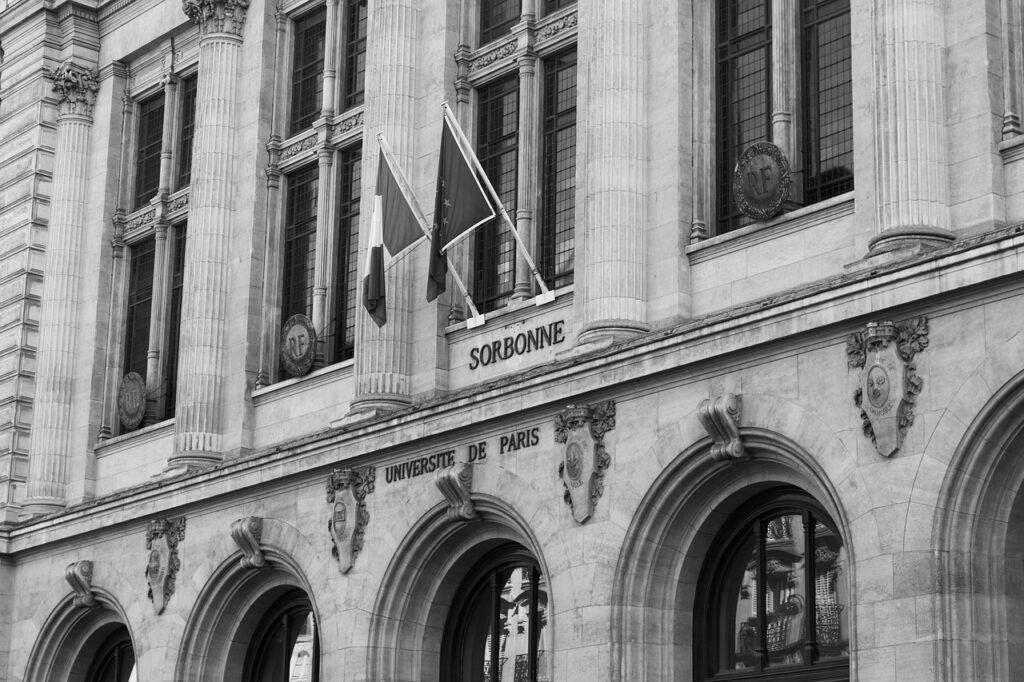What is La Sorbonne?
La Sorbonne, a name that immediately evokes intellect, history, and culture, is one of the most prestigious academic institutions in the world. Located in the heart of Paris, it has been the cradle of many academic and intellectual movements. When we speak of La Sorbonne, we refer to a group of universities and research institutes that share this historic heritage.
La Sorbonne is more than just a higher education institution. It is a symbol of French academic tradition—a place where intellectual rigor meets innovation. It attracts students from all backgrounds who wish to immerse themselves in its rich cultural and academic environment. The wide range of disciplines taught and the high quality of instruction make it a top choice for those seeking an exceptional education.
As a student or researcher at La Sorbonne, one becomes part of an international community engaged in the pursuit of knowledge. Exchanges between students and professors from around the world enrich the learning experience. In addition, the university’s central location in Paris provides unparalleled access to culture, art, and history.
History of La Sorbonne: From Origins to the Present
La Sorbonne’s history dates back to the 13th century. It was founded by Robert de Sorbon, chaplain to King Louis IX (Saint Louis), as a medieval college for poor theology students. This modest beginning laid the foundation for what would become a center of academic excellence.
Over the centuries, La Sorbonne underwent many transformations. Under Napoleon, it was reorganized into one of the central institutions of the University of Paris. Later reforms, particularly in the 20th century, divided it into several autonomous universities. Each stage of its history reinforced its pioneering role in education and research.
Today, La Sorbonne symbolizes tradition while remaining firmly oriented toward the future. It represents a harmonious blend of past and modernity, welcoming students and researchers from all over the world. Its architecture, libraries, and archives bear witness to its rich past, while its innovative programs and research projects reflect its commitment to the future.
Academic Programs
La Sorbonne offers a wide range of academic programs across many disciplines. From humanities and arts to social sciences and exact sciences, the university provides courses designed to meet the needs of students from diverse academic paths. These programs are both rigorous and innovative, responding to the evolving demands of modern society.
Programs at La Sorbonne emphasize not only theoretical knowledge but also practical application and research engagement. Students are encouraged to work on collaborative projects, participate in conferences, and publish their work. This holistic approach ensures that graduates are well prepared to face real-world challenges.
In addition, La Sorbonne offers dual-degree programs and partnerships with other prestigious universities worldwide. These opportunities enrich students’ academic experience and foster intercultural skills, preparing them to thrive in an international environment.
Research at La Sorbonne: Innovation and Contributions
La Sorbonne is renowned for its significant contributions to research across multiple fields. Its academic community is engaged in cutting-edge projects aimed at addressing some of the most pressing challenges of our time. This commitment to innovation and discovery positions La Sorbonne as a global leader in research.
Its laboratories work on diverse subjects, ranging from humanities to artificial intelligence. Researchers frequently collaborate with international institutions, sharing discoveries and participating in joint projects. Such collaborations reinforce La Sorbonne’s reputation as a center of excellence.
The results of this research extend beyond the university walls. They are regularly published in academic journals, presented at international conferences, and often influence public policy and sustainable development initiatives. This ability to advance knowledge while having a real-world impact lies at the core of La Sorbonne’s mission.
Student Life: Culture and Activities
Student life at La Sorbonne is as dynamic as it is diverse. Students have the opportunity to take part in a variety of cultural, sporting, and social activities. These not only balance academic work with leisure but also foster a strong sense of community.
La Sorbonne’s location near many of Paris’s cultural landmarks allows students to immerse themselves in the city’s art and history. Museum visits, theater performances, and concerts are frequently organized. These cultural experiences enrich student life and complement academic learning.
The university also hosts numerous student clubs and associations. Whether you are interested in debate, photography, sports, or social engagement, there is an organization for every passion. These groups provide opportunities to develop new skills, meet like-minded peers, and build a professional network.
Hidden Secrets and Lesser-Known Facts
La Sorbonne holds many secrets and fascinating stories. Did you know that one of the oldest libraries in Paris is housed within the university? The Sorbonne Library contains thousands of rare and ancient volumes, making it an invaluable resource for researchers.
Another noteworthy fact is La Sorbonne’s role during the events of May 1968. The university became a symbol of student protest and played a central role in the demonstrations that shook France. These events deeply marked its identity and continue to influence its commitment to academic freedom and intellectual expression.
Over the centuries, La Sorbonne has also welcomed many famous figures. Writers, scientists, and politicians have walked its halls. These individuals contributed to its intellectual richness and reinforced its prestige on the global stage.
International Partnerships
La Sorbonne maintains partnerships with universities and research institutions worldwide. These collaborations facilitate the exchange of ideas, cultures, and academic practices. They enrich study programs and open new horizons for students and researchers alike.
Through these partnerships, students have the opportunity to participate in international exchange programs. These experiences provide unique cultural immersion and a global perspective on their studies. They also allow students to develop valuable language and intercultural skills.
Beyond student exchanges, partnerships include joint research projects, international conferences, and sustainable development initiatives. Such collaborations strengthen La Sorbonne’s influence on the global academic stage and contribute to the advancement of knowledge in many fields.
Admissions: Process and Tips
Applying to La Sorbonne requires careful preparation. The first step is to select the program that best matches your interests and academic goals. Then, you must review the specific admission requirements for that program.
The application process usually involves submitting academic transcripts, letters of recommendation, and a motivation letter explaining why you want to study at La Sorbonne and how it aligns with your academic and professional path. It is highly recommended to begin preparing your application well in advance.
If you have questions, don’t hesitate to contact the admissions office for guidance. Once admitted, you will join a prestigious and dynamic academic community ready to support you on your educational journey.
Famous Alumni
La Sorbonne has educated many graduates who left a lasting mark on history. Among them is Marie Curie, a two-time Nobel laureate who revolutionized physics and chemistry. Her time at La Sorbonne was crucial in shaping her career and advancing science.
Another notable alumnus is Jean-Paul Sartre, the renowned philosopher and writer. His contributions to existential philosophy and literature had a global impact, influencing generations of thinkers and authors. His years at La Sorbonne nourished his intellectual development.
The celebrated playwright and Nobel Prize winner Samuel Beckett also studied at La Sorbonne. His work, which explores profound and universal themes, reflects the rigorous education and stimulating intellectual environment he found there.
These alumni, among many others, testify to the academic richness and worldwide influence of this legendary institution.






